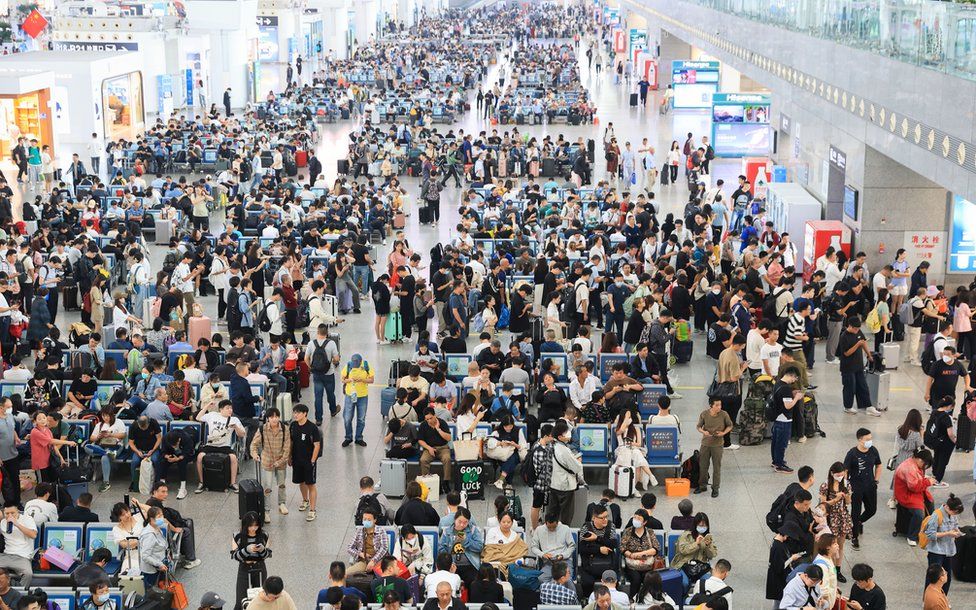China’s gloomy economy has not dampened its people’s wanderlust.
It is seeing record travel for the annual “Golden Week” holiday despite slow growth, high youth unemployment and a property market in crisis.
More than 21 million people will fly during the eight-day break, which began on Friday, according to China’s civil aviation regulator.
That includes 14,000 domestic flights a day as young Chinese on a shoestring budget look to explore closer to home.
This Golden Week – where the annual mid-autumn festival happened to coincide with National Day celebrations – has turned into the year’s longest break. It’s the second Golden Week holiday this year, following a shorter break in May. But with China’s economy showing no major signs of recovery since then, businesses are hopeful but wary.
And travellers are tightening their purse strings – young Chinese, who are eager to kick off more “revenge travel” after prolonged Covid-19 lockdowns, have been taking to social media to swap advice on how to make the most of the holiday.
Gaoyang, for instance, said he plans to cover nine Chinese cities, clocking 6000km between all of them, in just eight days. He considers himself a “special forces traveller”, a term for roughing it out so you can run through a packed yet cheap holiday schedule. Gaoyang’s itinerary involves scaling four mountains.
Others have flooded their feeds with hour-by-hour itineraries, detailed breakdowns of their budget and recommendations for affordable places to eat. A hashtag challenging people to “trek from China’s south to north” was widely discussed on Weibo while other popular topics included “budget travel” and “traveling on a whim”.
China’s national railway said it plans to run 12,000-odd trains each day over the holiday – a 20% jump on an average day otherwise – to meet the increased demand. Domestic travel bookings – for air and train tickets, hotel reservations and tour packages – for Golden Week surged by 88% compared to the previous week, said online travel agency Trip.com. And they are up by more than four times compared to the same period last year.
Top domestic destinations include Beijing, Shanghai, Chengdu and Hangzhou, which is currently hosting the Asian Games. Cities in the northwest, known for their scenic autumn landscapes, like Burqin and Urumqi in Xinjiang are also expecting more tourists, according to Trip.com.
But the average spend per traveller may not stack up against the increased traffic, warns Gary Bowerman, director of travel marketing firm Check-in Asia. He said the spends had been lower than forecast during the last Golden Week break in May when domestic travel had rebounded to pre-pandemic levels.

Local businesses that are vying for tourism dollars seem well aware of shrunken budgets. Some travel agencies are promoting “pure fun, no shopping” group tours to assure prospective customers that there are no hidden costs. Chinese food delivery and e-commerce app Dianping is encouraging people to take a nationwide food tour: “The motherland is so big, let’s go eat,” reads the tagline on one of its pages on Weibo.
But the deals haven’t tempted some, such as public relations executive Sally. The 30-year-old says she decided to stay put this Golden Week, instead taking only a day-trip with her friends to the outskirts of Beijing, where she lives.
“There is so much to see and explore within China. Of course we all want to enjoy ourselves, but the thought of spending money and the guilt that comes with it doesn’t interest me,” she said.
But on the whole, otherwise cautious consumers appear to be willing to splurge on one-time expenses like travel, said Steve Saxon, who leads consulting firm McKinsey’s travel practice in Asia. While domestic travel is certainly a boost for the sluggish economy, he said it’s not yet clear whether this is still the result of “pent-up demand because of travel restrictions” that had been in place for three years, or if the “demand will be long-lasting”.
This is also the first long holiday since China ended restrictions on people travelling outside of the country – it lifted a ban on group tours to more than 70 countries in August.

Most people still have some reservations about travelling out of China, with data from travel analytics firm ForwardKeys showing outbound travels down 40% when compared with 2019.
But momentum seems to be picking up, with Malaysia, Thailand, and South Korea expected to see a larger number of Chinese tourists this week compared with Golden Week in 2019.
“I wanted to go somewhere abroad because anywhere in China would be so, so crowded,” says journalist Yucca Yu who has planned an eight-day trip to Malaysia, which includes hiking up the country’s highest mountain, Mount Kinabalu. He said he picked South East Asia because he didn’t want to spend “too much” on flights.
“I guess people like me are still ‘revenge travelling’ because I haven’t travelled abroad for leisure in years,” he added.
“I will have to save up in other aspects of life – living in poverty but travelling richly.”
Source : BBC















